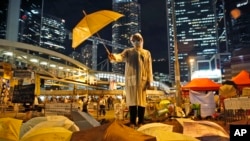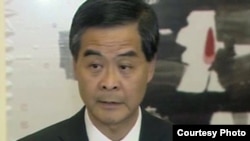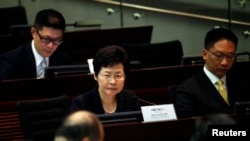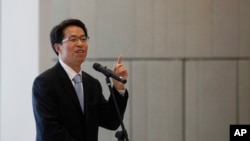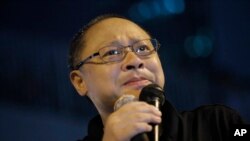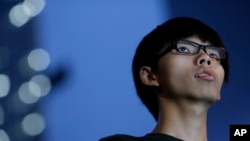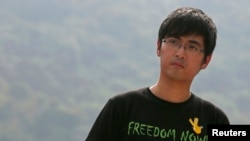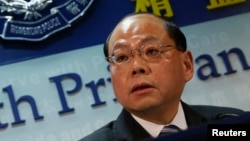While Hong Kong’s Umbrella Revolution has made headlines worldwide, some of the principal players remain relatively unknown. Even though the government has called off scheduled talks with the protesters, those leaders still seek a resolution to the occupation of key business districts. Here is a look at some of those whose presence will be felt when the talks finally get under way.
The protesters oppose China's decision that a Beijing-approved nominating committee will choose candidates to run for election as the city's leader, the chief executive. They also want the current chief executive to resign.
Leung Chun-ying, Chief Executive
While his presence will be felt, the de facto prime minister of Hong Kong is not expected to be at the negotiation table if the two sides agree to reschedule talks.
This is mainly because the Umbrella Movement refuses to negotiate with him directly. Leung, who took office in July 2012, is a building surveyor by trade and self-made millionaire. Hong Kong residents see him has having close ties to the central government in Beijing. He was the first Hong Kong leader to make his inauguration speech in Mandarin, the language of mainland China, instead of Cantonese, the mother tongue of Hong Kong. But Leung, 60, may have very little to offer the protesters unless Beijing radically changes its position on electoral reform - an unlikely proposition.
Carrie Lam, Chief Secretary for Administration
Hong Kong’s number two official, Lam, 57, will act as her boss’s proxy if and when talks between the government and activists commence.
Until recently one of the most popular leaders in Hong Kong and known locally as the Iron Lady, Lam grew up in a typically small Hong Kong apartment where there was not enough space for her own desk and chair. Lam remains one of the few leaders students believe they can deal with. However, there remains considerable anger at her willingness to sign off on C.Y. Leung’s report to Beijing - written after five months of public consultation - that stated the Hong Kong people agreed that candidates for the 2017 chief executive election must be vetted by a committee loyal to Beijing. She lost even more favor Thursday when she announced a first round of negotiations with students would be canceled after they called for another wave of civil disobedience.
Zhang Xiaoming, Director, Central Government Liaison Office
While little of substance is known about Beijing’s 51-year-old man in Hong Kong, Zhang flamed the fires of dissent in August when he told pro-democracy law makers: “The fact that you are allowed to stay alive already shows the country's inclusiveness.”
Twelve days later, the Standing Committee of the National People's Congress, China’s highest law-making body, decreed that candidates for the 2017 chief executive election must be patriots and receive majority support from a 1,200-person nominating committee of broadly pro-Beijing members. Commenting on the fact that the short-listed candidates would then be voted upon by universal suffrage, Zhang channeled a particularly disastrous period of Chinese history and declared this a “leap forward”. One local blogger reflected: “It’s like your mother and father saying they will give you a short list of the three people they will let you marry - and you like none of them.”
Benny Tai Yiu-ting, Co-founder, Occupy Central with Peace and Love
Born in 1965, the Hong Kong University law professor is renowned as a concerned teacher and a passionate democrat.
Guided by his Occupy co-leaders, Chan Kin-man and veteran activist Chu Yiu-ming, Tai helped draft a first proposal for universal suffrage in 2004, prior to elections in 2007 and 2008. The recipient of death threats for his beliefs and despised by Beijing, Tai has kept a relatively low profile since Hong Kong’s students seized the initiative and took over the streets. Tai now appears to be concentrating on shoring up support for the students among older professionals in the city.
Joshua Wong Chi-fung, Co-founder, Scholarism
The face of 17-year-old Wong adorns the cover of the latest international edition of Time magazine, and indeed the clean-cut high school student embodies the idealism and virtues for which Hong Kong’s young democracy protesters have become internationally renowned.
While his school grades are said to have faltered, how many teens can lay claim to challenging the full might of the Chinese government before completing the first year of a university course? Wong cut his teeth in political activism aged 13 by challenging the city’s proposed high-speed rail link. He then mobilized over 100,000 students to face down government plans for a communist Chinese education and patriotism program before taking a lead on the democracy reform issue. China accuses him of being a U.S. spy. Anyone who listens to Wong speak though can hear the conviction of his belief: that the people should be allowed to choose the candidates who wish to stand as the next leader of this southern Chinese city.
Alex Chow Yong-kang, General Secretary, Hong Kong Federation of Students
While Occupy Central shores up public support and Scholarism looks after the social media side of the Umbrella Movement, it is Alex Chow and the HKFS that have been negotiating to hold a dialogue with the government. A student at Hong Kong University, Chow has repeatedly been seen close to tears as events have unfolded over the last weeks.
Considered the only credible protest leader the government could do business with - partly because of his leadership skills and partly because Tai and Wong are believed to appear on Beijing’s “Blue List” of national security threats - it was in fact Chow who prompted the first occupation of Central in the hours after Hong Kong’s annual July 1 democracy march this year. The sit-in led to more than 500 arrests and prompted Chow to declare: “We have to upgrade to a civil disobedience movement.” While some argue the Umbrella movement needs a firmer hand at the tiller, Chow is happy to play the long game - and let the students out on the street decide how long they wish to make their point. In the meantime, Carrie Lam and the 24-year-old comparative literature and sociology student will be the main protagonists seeking to end the weeks-long impasse.
Andy Tsang, Hong Kong Police Commissioner
When one of his senior officers issued the order to fire 87 tear gas canisters at democracy activists gathered outside the Hong Kong legislature September 28, Tsang’s name became inextricably linked with Occupy Central.
It was at that moment the photographs of young students protecting themselves with umbrellas were projected around the world, and a civil disobedience movement suddenly evolved into the Umbrella Revolution - to the consternation of a political elite in Beijing concerned by any parallel with the Arab Spring and Tiananmen Square in 1989. Chief executive Leung denies news reports that Tsang faces dismissal, declaring: “The government and police serve with one heart.” There remains though, little love for Tsang among the protesters. While the police have kept a low profile since using the tear gas, many protesters agree Tsang will scarcely hesitate if ordered to take back the streets. His future is likely to be a key point of discussion in any negotiations between the protesters and the government.




